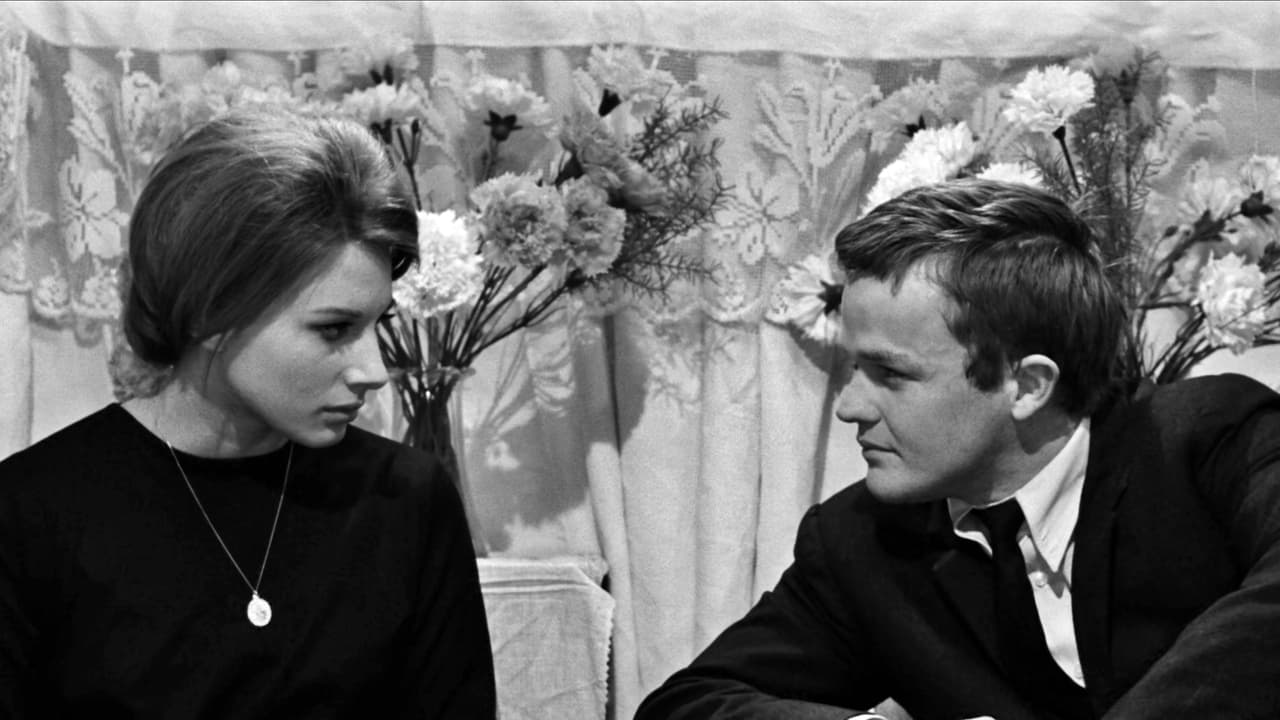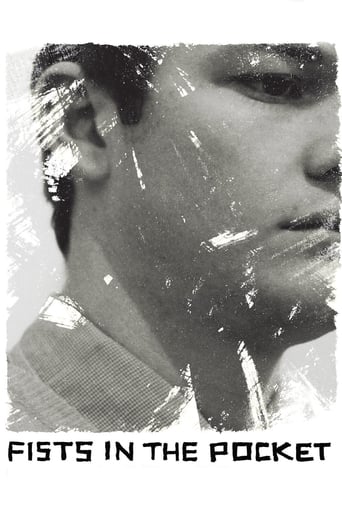



What a waste of my time!!!
Plot so thin, it passes unnoticed.
This movie was so-so. It had it's moments, but wasn't the greatest.
View MoreGreat example of an old-fashioned, pure-at-heart escapist event movie that doesn't pretend to be anything that it's not and has boat loads of fun being its own ludicrous self.
View MoreThe title had led me to anticipate gritty realist drama; but the Italian cinema had by 1965 largely lost interest in those at the bottom of life's heap, and this film - which seems intended to be an extremely black comedy - is instead set amidst a household still struggling precariously to maintain it's grip on its former secure status.Fifty years ago all this must have seemed bracingly anarchic; but sophisticated audiences at that time still laughed indulgently at the scene in which hulking Gaston Modot hilariously strikes a bourgeois woman in 'L'Age d'Or' for accidentally spilling a drink down him (Bunuel himself wasn't particularly impressed with 'Fists in the Pocket'); and what could then be acclaimed as non-conformity increasingly looks to modern politically correct sensibilities like bullying born of boredom (especially since the anti-hero Alessandro seems still to subsist at a social strata at which he's spared the far more tedious burden of having to work for a living).As played by the slightly built, baby-faced Lou Castel, Allessandro lacks the physically intimidating presence of, say, David Warner as 'Morgan!' that would make him seem like a bully; but he still reserves some of his most brutal treatment for those least able to defend themselves, like a blind woman and a mentally handicapped epileptic.
View MoreAn epileptic young man in a bourgeois family who,as soon we meet them ,seems not only to be living in the past,but to be already dead :they only get out of the house to go to the cemetery;the blind wodowed mother has delegated her authority to her elder son ,a nice handome man who "takes care" of his siblings :a girl who seems in love with her brother -she does want to see the prostitute her brother sleeps with,as though she would like to be her(and thus his) just for a while -, a half-wit ,and Sandro who passes for a ne'er do well to his clever brother's eyes:he is denied everything ,all his attempts to get out of this mausoleum fail (taking his driving licence , raising rabbits )and his restrained hatred knows no bounds .He's really got a chip on his shoulder ,and he becomes almost fascistic : one has to get rid of the improductive population - like in Rosselini's " Germania Anno Zero "in which a schoolteacher ,feeling nostalgic for the Führer, urges a little boy to kill his bedridden father-He does not realize he is in a cul de sac ;his big brother did stay with them because of the mother ,but as soon as she dies ,he wants to get married and to live his life .Sexually repressed -he refuses to dance with a girl who invites him (and not the other way around) and can only have sex with a prostitute,life is a blind alley for Sandro ;as for his big brother,he cannot stand his licit happiness ,he feels the approval of the others ,of the society ,still cooped up in this petty life.As he is not able to get rid of this powerful man who accepts the golden rules,he sacrifices a substitute ,his kid brother.Bellochio 's movie should be seen as a fable ,a transparent metaphor ,not really realistic ,with elements of melodrama (the sister's fate);Sandro is sick ,but so are people around them even though they are not aware that their old world ,through a slow process but inexorably , is collapsing .Epilepsy is just an alibi."Il Pugni In Tasca" took a rebel stand against the family;but Marco Bellochio's fight had only just begun: " Nel Name Del Padre " denounced the Church;in "Marcia Trionfale",at a time the militay service still existed in Italy (and almost everywhere in Europa),the army was hauled over the coals.
View MorePimpin places a call to his favorite writer Michel Houellebecq.Pimpin: Hello.Michel: Hello. Who is this?Pimpin: Michel, its me Pimpin.Michel: What do you want?Pimpin: Sorry to disturb. I wanted to discuss a film that I watched. I wanted to hear your thoughts on it. Its this Italian film - Fists in the Pocket by Marco Belloccio. Came out in the 60s.Michel: OK.Pimpin: What do you think about it?Michel: It did have a couple of nice pieces of ass. Paola Pitagora was unforgettable.Pimpin: Hahahha. I agree. What did you think about the film?Michel: Well, it was one of those films where the protagonist rebelled against his family and Catholic values. You know what I think about all that stuff, Pimpin. Nothing good came out of it. Sure, a lot of people escaped their families. And then they went and lived alone. Did drugs. Drank a lot. Individuality and personal freedom. Look at where all that got Europe now.Pimpin: I thought the film was quite slow.Michel: Its a piece of crap. But then, it was made in the 60s.Pimpin: I did some research on it. The film apparently predicted the student and youth riots of the late 60s in Italy.Michel: Hahahah. You really bought into all that crap?Pimpin: I know its a bit like how Indian social commentators use crappy films like Deewar to explain the 70s and 80s.Michel: Exactly. Its completely phony Pimpin.Pimpin: I'm still confused. I don't know what to think about the film. I mean, the film is quite depressing.Michel: Well, tell me something about the cinematography, pacing and background score. That would help us interpret it better.Pimpin: It was a very stark film. Morricone's score was very bleak. The score is played during all the murder and post-murder scenes. It is one of Morricone's bleakest scores. I liked the way some of the scenes were framed. Like at the party where the rebellious protagonist is sitting alone and there are a lot of people dancing. He does not even drink. He has no bad habits. But he wants to kill off his family. The pacing was slow.Michel: Did you identify with the film?Pimpin: Sort of. But like I said it was too slow. The actors were great. The director was quite successful in capturing the claustrophobic environment in which the family lives.Michel: Did you get married recently?Pimpin: Yes.Michel: So you are not to be trusted.Pimpin: Why?Michel: You would have liked this film a lot more during your wild bachelor days.Pimpin: Thats probably true, Michel.Michel: It is.Pimpin: I did think that it was a very personal film. I mean, the director is very talented. He did portray the ills of the bourgeois life and the life lived on pure instinct quite well. I don't think he was rooting for either.Michel: Did it work as a murder mystery?Pimpin: No. I think it works best as the zeitgeist of that time in Italy. But it was quite boring for me.Michel: OK. Is there anything else that you want to discuss?Pimpin: The actors were great. I mean, most of them were better than the ones in the worst Indian movies. But I would not watch another movie because anyone of them were in it.Michel: OK.Pimpin: Read about he Paris attacks. Quite scary.Michel: (Silence)Pimpin: Hello?Michel: Pimpin, you weren't too impressed by this film. In fact, you were bored to death. You only called me because it had an 8 rating on IMDb.Pimpin: You are right, Michel.Michel: Take care, Pimpin.Pimpin: Bye, Michel.Michel: Bye
View MoreI found it a bit disappointing. There are great moments -the funeral or the dance party for example- but as a whole I came out of the theater pretty unimpressed. Still, you have to remember that it first came out in 1965,and what happens in the movie must have chilled the Italian public of that time. Rating;6
View More